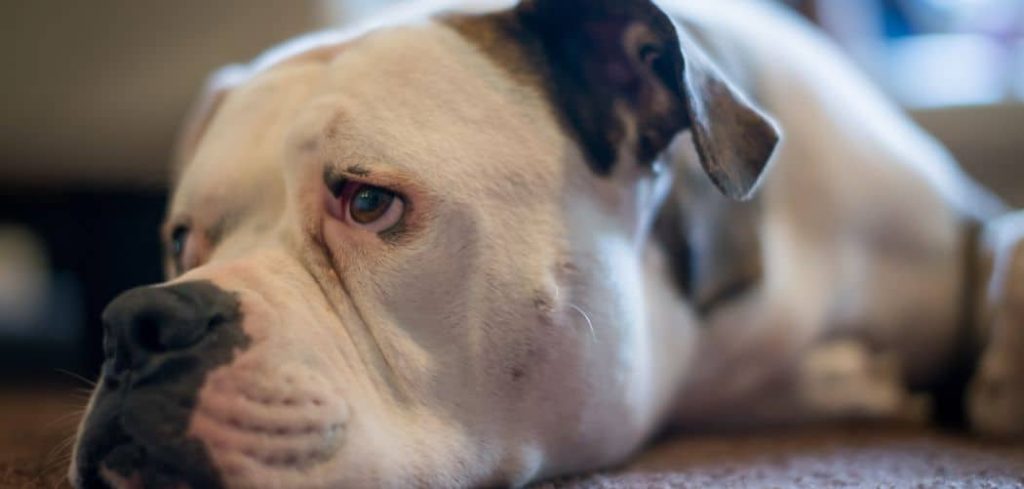If a dog is breathing heavily after eating, it can be worrying for owners. While some causes are harmless, others may point to more serious underlying health conditions.
We outline the possible causes of heavy breathing after eating, what you can do at home, and when to seek veterinary help.
Dog Breathing Heavy After Eating — Why It Happens
Heavy breathing after meals in dogs can stem from multiple health or environmental factors. Some dogs may struggle with overeating or eating too quickly, leading to temporary discomfort. Others may have underlying conditions such as heart disease, respiratory problems, or digestive issues that make post-meal breathing more difficult.
In some cases, obesity, heat, or stress can also play a role in why a dog pants or breathes heavily after eating.

Dog Breathing Heavily After Eating: Possible Causes
Overeating or Eating Too Fast
When a dog consumes food too quickly or eats large amounts in one sitting, the stomach can become distended.
This pressure can push against the diaphragm and lungs, making it harder for the dog to breathe normally. Owners may notice panting, pacing, or restlessness after meals.
This cause is especially concerning in large, deep-chested breeds, as overeating or gulping food can increase the risk of bloat, a life-threatening condition.
Read more: Dog Breathing Heavy and Not Eating (Here’s why)
Bloat (Gastric Dilatation-Volvulus)
Bloat occurs when the stomach fills with gas and sometimes twists on itself.
Dogs may show signs like rapid, heavy breathing, distended abdomen, drooling, or repeated attempts to vomit without bringing anything up. This is a medical emergency.
Heavy breathing after eating can be one of the earliest warning signs, especially in at-risk breeds like Great Danes, German Shepherds, and Dobermans.
Heart Disease
Heart conditions such as congestive heart failure can make it difficult for a dog to circulate blood effectively.
After eating, the heart works harder, and this stress may cause heavy or labored breathing. Dogs with heart disease may also cough, tire easily, or faint after exertion.
If breathing problems occur regularly after meals, it’s important to have the heart evaluated by a veterinarian.
Respiratory Issues
Dogs with underlying respiratory problems, such as tracheal collapse, bronchitis, or laryngeal paralysis, may experience worsened breathing after eating.
Food intake can put added strain on the respiratory system, leading to panting, wheezing, or difficulty catching breath.
Smaller breeds like Chihuahuas and Yorkies are especially prone to tracheal collapse, while larger breeds often face laryngeal issues.
Obesity
Excess weight places strain on both the heart and lungs. After eating, overweight dogs may breathe heavily because their body is already under stress. Even small meals can make them uncomfortable.
Other symptoms of obesity include reduced stamina, reluctance to exercise, and heat intolerance.
Heat and Stress
Dogs that are warm, anxious, or stressed at mealtime may pant heavily afterward. While panting is a normal cooling mechanism, combined with food intake it can appear as abnormal heavy breathing.
This type of heavy breathing typically resolves once the dog relaxes and cools down, but persistent episodes should still be monitored.
What to Do If Your Dog Is Breathing Heavily After Eating
If a dog breathes heavily after meals, first consider whether they are eating too quickly.
Using a slow feeder bowl or dividing meals into smaller portions can reduce post-meal discomfort. Keeping dogs calm before and after eating also helps minimize stress on the body.
Ensure your dog is not exercising right before or after meals, as this increases the risk of bloat. Instead, allow for quiet rest periods so the digestive system can function smoothly.
Monitor your dog’s weight and feeding habits. If obesity is suspected, work with a veterinarian to create a safe weight-loss plan. For dogs that appear stressed, reducing environmental triggers and offering a calm feeding environment may help.
However, if the heavy breathing is frequent, severe, or paired with other symptoms like coughing, fainting, bloated stomach, or vomiting, professional evaluation is necessary.
When to Call or Visit Your Vet
If your dog shows signs of abdominal swelling, unproductive retching, or sudden collapse after eating, seek emergency veterinary care immediately. These may indicate bloat, which requires urgent treatment.
Call your vet if heavy breathing occurs regularly after meals, particularly if your dog is a large breed prone to gastric issues.
Heart or respiratory disease could also be behind the symptom, and early diagnosis makes a big difference.
Other red flags include lethargy, persistent coughing, difficulty lying down comfortably, or rapid breathing that does not improve with rest.
Puppies, senior dogs, and those with pre-existing health conditions should always be evaluated quickly when new breathing problems appear.
Read more: Dog Breathing Heavy and Throwing Up (Here’s what it means)
Key Takeaway
Heavy breathing after eating in dogs can range from harmless overeating to serious emergencies like bloat or heart disease. Observing when and how often it happens is essential to determining the cause.
Simple changes like slowing mealtime or adjusting portion sizes may help in mild cases, but recurring or severe breathing issues should never be ignored.
Always err on the side of caution and consult a veterinarian when your dog’s breathing seems abnormal.
With prompt care and attention, many of the conditions behind post-meal breathing problems can be managed, helping dogs stay comfortable and safe after every meal.
